モーリス・レーナルト
Maurice
Leenhardt, 1878-1954

モーリス・レーナルト
Maurice
Leenhardt, 1878-1954

モー リス・レーナルト(Maurice Leenhardt, 1878-1954)はフランスの民族学者でありプロテスタント牧師(宣教師:la Société des missions évangéliques de Paris)。ニューカレドニアに25年間滞在して、カナク人の間で布教に務めると共に、詳細な民族誌記述を残した。またメラネシア人の人格・身体・思惟 の概念に関する独特の分析をおこない、文化人類学の歴史のなかでの貢献をもたらした。フランスの高等研究院の「宗教史ならびに非文明化の人びとの研究」講 座担当者(1935-1950)。前任者は、マルセル・モース(Marcel Mauss, 1872-1950)。交流のあった研究者としてはレヴィ=ブリュル(Lucien Lévy-Bruhl,1857-1939)、ミッシェル・レリス(Julien Michel Leiris, 1901-1990): など。
| Maurice Leenhardt,
né le 9 mars 1878 à Montauban et mort le 26 janvier 1954 à Paris, est
un pasteur, ethnologue et missionnaire adepte de la missiologie
français. Spécialiste du peuple kanak, il est missionnaire en
Nouvelle-Calédonie de 1902 à 1926, puis ethnologue et universitaire de
1942 à sa mort. |
モーリス・レーナルトは1878年3月9日にモントーバンで生まれ、1954年1月26日にパリで没したフランス人牧師、民族学者、宣教学者である。1902年から1926年までニューカレドニアで宣教師を務め、1942年から亡くなるまで民族学者、学者として活躍した。 |
| Biographie Années de formation D'origine alsacienne, la famille de Maurice Leenhardt s'est installée dans le Sud-Ouest au milieu du xixe siècle1. Son père Franz Leenhardt, géologue devenu pasteur protestant2, avait mis en place et assuré un cours de sciences physiques et naturelles à la faculté de théologie protestante de Montauban3. Quatrième d'une famille de 5 enfants, Jean Henri Maurice Leenhardt est un élève turbulent. Il décroche son baccalauréat en 1898, après trois tentatives infructueuses4, son père l'ayant inscrit au collège pastoral des Batignolles à Paris. Durant cette période, il participe régulièrement aux activités de la Société des missions évangéliques de Paris (SMEP). Maurice Leenhardt s'inscrit dans la faculté où son père est enseignant en 1899 et y soutient en 1902 une thèse de licence sur Le mouvement éthiopien5 au sud de l'Afrique de 1896 à 18996. Ce mouvement est sous l'égide de deux pasteurs : Mangena Mokone (sv) et James Dawne et s'inscrit dans une mouvance séparatiste, messianique et indigéniste7. Selon Leenhardt, il s'agit d'un mouvement de revendication sociale issu des réactions légitimes des Africains contre les discriminations raciales3. Il a pour maîtres Alfred Boegner et Hermann Kruger[réf. souhaitée]. |
バイオグラフィー 形成期 アルザス出身のモーリス・レーナルト一家は、19世紀半ばにフランス南西部に移住した1。地質学者であった父のフランツ・レーナルトはプロテスタントの牧 師となり2、モントーバンのプロテスタント神学部で物理学と自然科学の講座を開設し教えた3。5人兄弟の4番目として生まれたジャン・アンリ・モーリス・ レーナルトは、波乱万丈の子供だった。父は彼をパリのコレージュ・パストラル・デ・バティニョールに入学させたが、彼は3度の受験に失敗し4、1898年 にバカロレアに合格した。この時期、彼はパリ外国宣教会(SMEP)の活動に定期的に参加していた。 モーリス・レーナルトは1899年に父親が教鞭をとっていた大学に入学し、1902年に1896年から18996年までの南部アフリカにおけるエチオピア 運動5に関する学位論文を提出した。この運動は、マンゲナ・モコネ(sv)とジェームス・ドーネという2人の牧師に指導されたもので、分離主義、メシア主 義、土着運動の一部であった7。レーナルトによれば、人種差別に対するアフリカ人の正当な反応から生まれた社会的抗議運動である3。 その指導者はアルフレッド・ベーグナーとヘルマン・クルーガーであった[参考文献:advised]。 |
| 1902-1920 : première mission en Nouvelle-Calédonie Les îles Loyauté situées au nord-ouest de Nouméa ont été évangélisées à partir de 1840 par l'église anglicane et la London Misionary Society8 . Ces missionnaires anglais déploient dans en Océanie une stratégie qui leur permet de toucher un maximum de personnes sans être contrains d'envoyer un grand nombre de missionnaires : ils forment parmi les nouveaux convertis des prédicateurs des nata)9, lesquels vont ensuite transmettre l'évangile à leurs clans10.  Les maisons des natas à Houailou (1er quart du XXe siècle) Au début du xxe siècle, les autorités protestantes sont autorisées par le gouverneur Paul Feuillet à s'implanter sur la Grande Terre pour ne pas laisser le monopole de l'évangélisation des Kanaks aux maristes9. Ces premiers pasteurs font alors appel aux natas des îles Loyautés pour les aider dans leur tâche. Cependant, la mission protestante rencontre rapidement des difficultés avec les colons qui demandent son expulsion car les protestants sont accusés d'inciter les « indigènes » à résister à l'autorité des blancs11. C'est dans ce contexte que Maurice Leenhardt est envoyé, en renfort, comme missionnaire par la Société des missions évangéliques de Paris, le 13 novembre 1902 en Nouvelle-Calédonie, à la demande du pasteur Philadelphe Delord11. Maurice Leenhardt fonde, dans la vallée de Houaïlou, la mission de « Dö nèvâ » le 19 avril 1903, sur une propriété de 20 ha. Il y établit d'abord une école pastorale puis une une école primaire12. S'inspirant des méthodes des missionnaires anglicans de la LMS, il s'attache à comprendre la mentalité de ce peuple que l'on pense en voie d'extinction, et qui pouvait lui rappeler les camisards cévenols13. Quand il est arrivé en Nouvelle-Calédonie, il a été d'ailleurs accueilli par ces mots du maire de Nouméa : « Que venez-vous faire ici ? Dans dix ans il n'y aura plus de Kanaks »14. Depuis la répression de la révolte des Kanaks de 1878, l'administration coloniale considère les autochtones comme une nuisance. Le haut-commissaire Testard compare les Kanaks à des loups et recommande de « faire des battues » pour s'en débarrasser15. En 1887, les autochtones sont soumis au code de l'indigénat qui restreint leur liberté de circulation, crée des réserves et autorise la réquisition des personnes pour assurer des travaux forcés précédemment dévolus aux bagnards16. Les canaques sont priés de quitter leurs terres ancestrales pour laisser la place aux colons17. Au début du xxe siècle, les terres détenues par les Kanaks ne représente plus que 10% de la surface de la Grande Terre, pour une population de 10 000 habitants9. Les conflits fonciers se multiplient avec les éleveurs européens qui laissent pâturer leurs troupeaux sur les terres des autochtones18. Ces derniers sont particulièrement découragés : le taux de natalité est au plus bas et l'alcoolisme fait des ravages dans cette population9. « On nous a montré un peuple s'élançant dans les bras d'un bon Jésus, mais je ne trouve guère que le fier canaque de l'Insurrection qui, vaincu, préfère ne pas avoir d'enfants que de les voir exploités par les blancs. »19 — M. Leenhardt, Lettre de Juin 1903 à ses parents |
1902年~1920年:ニューカレドニアにおける最初の伝道 ヌメアの北西に位置するロイヤリティ諸島は、1840年以降、英国国教会とロンドン宣教協会8 によって伝道された。これらのイギリス人宣教師たちは、大勢の宣教師を派遣することなく、できるだけ多くの人々に福音を伝えることを可能にする戦略をオセ アニアで展開した。彼らは、新しい改宗者の中から説教者(ナタ)9を養成し、彼らはその後、一族に福音を伝えた10。  フアイユのナタの家(20世紀第1四半期) 20世紀初頭、プロテスタント当局はポール・フィーレ総督の許可を得て、グランドテール(Grande Terre)に進出し、マリスト派にカナク伝道を独占させないようにした9。そして、この最初の牧師たちは、ロイヤリティ諸島のナタスに自分たちの仕事 を手伝ってくれるよう呼びかけた。しかし、このプロテスタント伝道団はすぐに植民地側と対立し、プロテスタントが「原住民」を扇動して白人の権威に抵抗さ せたと非難され、追放を要求された11。このような状況の中、モーリス・レーナルトは1902年11月13日、フィラデルフィア・ドロド牧師11の要請を 受け、パリ福音宣教協会からニューカレドニアに増援宣教師として派遣された。 モーリス・レーナルトは1903年4月19日、フアイルー渓谷の20ヘクタールの土地に「ドネバ」宣教会を設立した。彼はまず司牧学校を設立し、次に小学 校を設立した12。LMS英国国教会の宣教師の手法に触発された彼は、絶滅寸前と思われ、セヴェンヌのカミサール人13を彷彿とさせるこの民族のメンタリ ティーを理解しようと努めた。ニューカレドニアに到着したとき、彼はヌメア市長にこう言われた。10年後にはカナク人など残っていないだろう」14。 1878年にカナクの反乱が鎮圧されて以来、植民地政府はカナクを厄介者とみなしてきた。テスタード高等弁務官はカナク人をオオカミにたとえ、「バ トゥー」による駆除を推奨した15。1887年には先住民法典が制定され、先住民の移動の自由が制限され、保護区が設けられ、以前は囚人に割り当てられて いた強制労働をさせるために人々を徴発することが許可された16。カナク人は先祖伝来の土地から立ち退き、入植者のために道を開くよう求められた17。 20世紀初頭、カナク人が所有していた土地は、人口1万人に対し、グランドテールの表面積のわずか10%に過ぎなかった9。原住民の土地に牛の放牧を許 可しているヨーロッパ人畜産農家との土地紛争が増加していた18。原住民は特に落胆していた。出生率は過去最低を記録し、アルコール中毒が人口を蝕んでい た9。 「私たちは善良なイエスの腕の中に殺到する民衆を見せられたが、私が見つけることができるのは、敗戦後、白人に搾取されるのを見るよりも子供を産まないことを好む、反乱軍の誇り高きカナクだけだ」19。 - M.レーナルト、1903年6月の両親への手紙 |
Maurice Leenhardt va dès lors
s'attacher à limiter les abus dans la région d'Houaïlou. Il fait ainsi
appel à plusieurs reprises au gouverneur lorsqu'il constate des
irrégularités, allant jusqu'à menacer de rapporter aux autorités de
métropole des décisions trop favorables aux colons. Il s'insurge contre
les réquisitions abusives de main d'œuvre au moment des récoltes20.
Cette attitude « indigénophile » lui valent les critiques de certains
colons et des menaces, mais incitent des Kanaks païens (estimés à 6000
en 1902)21 à se convertir au protestantisme22, avec l'espoir qu'ils
pourront ainsi « construire des clôtures contre les invasions du bétail
»22. Il lutte également contre l'alcoolisme, exigeant des nouveaux
convertis l'abstinence totale d'alcool pour participer à la Cène12.
Comme cette exigence risque de briser les liens familiaux et
commerciaux que les canaques protestants entretiennent avec ceux qui
sont demeurés païens, notamment lors de festivités traditionnelles (les
pilous) où la consommation d'alcool est importante, le pasteur autorise
ses ouailles à aider les païens lors des préparatifs, tant qu'ils ne
participent pas eux-mêmes à la fête23.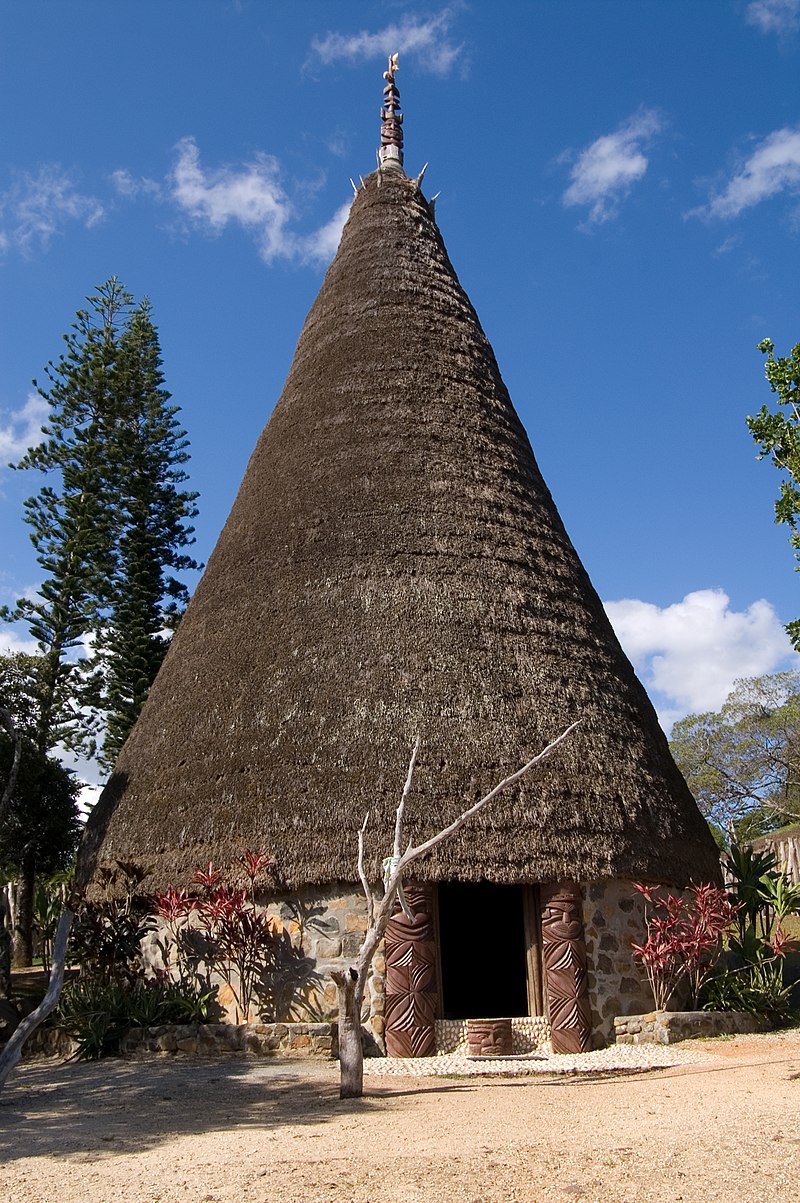 Maison conique avec un toit de chaume, au sommet une flèche en bois sculpté. Habitation kanak traditionnelle avec le poteau central qui se termine par une flèche faîtière. En parallèle, il traduit, avec l'aide des premiers étudiants de la mission, le Nouveau Testament en langue Ajië, le dialecte parlé dans la région d'Houaïlou. La traduction des textes bibliques dans les langues vernaculaires le distingue des missionnaires maristes qui ouvrent das écoles dans l'île pour apprendre le Français à leurs paroissiens et enseigner l'évangile en Français24. Toutefois, son approche est également différente de celle des pasteurs de la LMS car il s'attache particulièrement à conserver dans la traduction les expression idiomatiques canaques25. Ainsi, l'expression « pierre d'angle » utilisée dans le Nouveau Testament comme métaphore pour désigner Jésus26, devient le « Poteau central de la grande case » communautaire27. Le troisième axe développé par le missionnaire est la formation de pasteurs locaux qui doivent remplacer les natas loyaltiens qu'il considère comme insuffisamment formés et qui ne prêchent pas dans la langue Ajië28. La conversion au christianisme protestant est l'objectif, mais Leenhardt constate surtout des « adhésions de groupes ou d'individus », en réponse à un « besoin de réagir contre le souffle mortel de la civilisation ». En principe, l'école pastorale de Lifou (îles Loyauté) envoie ses postulants à l'école normale de Do Néva. En 1902, à la première conférence des natas avec Leenhardt, Delord compte 19 natas, tous loyaltiens. En 1908, ils sont 41 pasteurs, dont six de la Grande-Terre. En 1926, ils sont 49, dont quinze Calédoniens non-loyaltiens[réf. souhaitée]. |
モーリス・レーナルトはその後、フアイユ地方での先住民に対する虐待行為の制限調査活動に乗り出し
た。彼は、不正に気づいたときには何度も総督に訴え、植民者に有利すぎる決定をフランス首都当局に報告するとまで脅した。彼は、収穫時の労働力の乱暴な徴
発に抗議した20。このような「先住民びいき」の態度は、一部の入植者から批判や脅迫を受けたが、異教徒であるカナク人(1902年には6,000人と推
定される)21のプロテスタントへの改宗を促した22。彼はまた、アルコール依存症とも闘い、主の晩餐に参加するためにアルコールを完全に断つことを新し
い改宗者に要求した12。この要求は、プロテスタントのカナケ族が異教徒のまま維持してきた家族や仕事上のつながりを壊す危険があったため、特にアルコー
ルの消費量が多い伝統的な祭り(pilous)の際には、牧師は、自分たちが祭りに参加しない限り、異教徒の準備を手伝うことを許可した23。 藁葺き屋根の円錐形の家屋で、頂部には木彫りの尖塔がある。 カナク族の伝統的な住居で、中央の柱は尖塔で終わっている。 同時に、彼は最初の宣教師の学生たちの助けを借りて、新約聖書をホウアイルー地方で話されている方言であるアジエ語に翻訳した。このように聖書のテキスト を方言に翻訳したことで、彼は、島に学校を開いて教区民にフランス語を教え、フランス語で福音を教えたマリスト宣教師たちとは一線を画す存在となった 24。しかし、彼のアプローチはLMSの牧師たちとも異なっており、特に翻訳においてカナクの慣用句を守ることに熱心であった25。たとえば、新約聖書 でイエスの比喩として使われている「礎石」という表現26は、「大きな共同体の小屋の中心的な柱」となっている27。 宣教師が開発した3つ目の分野は、訓練が不十分で、アジ エ語で説教しないロイヤリストのナタスに代わって、地元の牧師を養成 することだった28 。 プロテスタント・キリスト教への改宗が目的であったが、レーナルトは何よりも、「文明の致命的な息吹に対抗する必要性」に応えた「集団や個人の癒着」に注 目した。原則として、リフー(ロイヤリティ諸島)の司牧学校は、ド・ネヴァの教員養成大学に後期研修生を送った。1902年、レーナルトとの最初の牧会者 会議で、19人の牧会者を数えたが、全員がロイヤリストだった。1908年には41人の牧師がおり、うち6人がグランドテール出身であった。1926年に は、ロイヤリスト以外のカレドン人15人を含む49人がいた。 |
| Il s'attache aussi à instruire
les laïcs qui se font arnaquer par les commerçants européens sur les
marchés, au moment où ils vendent leur récolte28. Au fil des années, Do Néva atteint l'auto-suffisance alimentaire et rayonne culturellement sur les autres vallées de la Grande Terre. Le pasteur entretient une correspondance en Ajië avec des autres vallées 29. Grâce aux relations de confiance établies avec les autochtones, il obtient que ses interlocuateurs canaques écrivent, en langue Ajië, ou en langue Paici parlée plus au Nord, des mythes ou une description des institutions traditionnelles, textes qu'il publie sous leurs noms. Le principal et le plus prolifique de ces auteurs, le pasteur Bwesou Eurijisi (ou Boesou Eripisi) (1866-1947), un des premiers pasteurs protestants indigènes consacrés à Do Neva, laisse des dizaines de cahiers30. Son nom est cité parmi les quinze auteurs des Documents, tout comme celui d'Eleisha Nabayes, de Yené Bwêêrhexau (René Boréréou) et Joané Nigoth[réf. souhaitée]. Selon James Clifford (anthropologue et historien) (en), Maurice Leenhardt, resté seul pasteur en poste sur la Grande-Terre pendant la guerre 1914-191831, joue un rôle « difficile et ambigu »32 . La relation de confiance établie avec la population kanak, principalement protestante, fait que le premier contingent indigène de 1915 est de 450 protestants (sur un total de 650)33. L'arrêt du recrutement en 1916 est bienvenu. Maurice Leenhardt informe en 1916 le gouverneur Jules Repiquet des risques liés au recrutement forcé[réf. souhaitée]. La reprise maladroite du recrutement en 1917 amène la révolte kanak de 1917. Le procès entraîne l'inculpation du chef Néa (Wanas, Wéava). En arrêtant un innocent, la justice française perd toute crédibilité vis à vis de la population autochtone34. Maurice Leenhardt est lui-même accusé par un prêtre catholique d'avoir fomenté cette révolte et appelé à la barre le 5 septembre 191935. Maurice Leenhardt, grâce aux natas et au soutien de la population, trouve l'origine de la monnaie noire qui a circulé parmi les insurgés et à prouver l'innocence de Néa35. Le devin Paétou, inspirateur du mouvement, se rend à Leenhardt, qui l'accompagne chez le Gouverneur pour sa reddition. (Source : Jean Guiart 2001:159).[à recycler] Après 10 années passées en Nouvelle-Calédonie comme missionnaire, Maurice Leenhardt et sa famille regagnent la métropole le 9 mars 1920, peu avant la mort de son père36. |
彼はまた、市場で収穫物28を売る際にヨーロッパ人商人にぼったくられていた素人たちを教育することにも努めた。 何年もかけて、ド・ネヴァは食糧自給を達成し、その文化的影響をグランドテールの他の渓谷にも広めた。牧師はアジエで他の渓谷との文通を続けている29。 原住民たちとの信頼関係のおかげで、彼はカナク人の対話者たちに、アジ エ語や、さらに北で話されているパイチ語で、神話や伝統的な制度についての 記述を書かせ、それを彼らの名前で出版した。これらの著者のなかでも最も多作で、ド・ネヴァに献身した最初の先住民プロテスタントの牧師の一人であるブ ウェソウ・エウリジシ(またはボエソウ・エリピシ)牧師(1866~1947年)は、何十冊ものノートを残している30。彼の名前は、Eleisha Nabayes、Yené Bwêrhexau(René Boréréou)、Joané Nigothの名前と同様に、『文書』の15人の著者の中に引用されている[ref.request]。 ジェームズ・クリフォード(人類学者、歴史家)によれば、1914年から1918年の戦時中31 、グランドテールで唯一の牧師であり続けたモーリス・レーナルトは、「困難で曖昧な」役割を果たした32 。主にプロテスタントのカナク族との間に築かれた信頼関係により、1915 年の最初の先住民部隊は 450 人のプロテスタントで構成された(総勢 650 人のうち)33。1916 年の募集停止は歓迎された。1916 年、モーリス・レーナルトは、ジュール・レピケ総督に強制徴用に伴う危険性を伝えた。 1917 年の不器用な徴用再開は、1917 年のカナク族の反乱につながった。裁判の結果、族長ネア(ワナス、ウェアヴァ)が起訴された。無実の男を逮捕したことで、フランスの司法制度は先住民か らの信頼を失った34。モーリス・リーンハルト自身も、カトリック司祭から反乱を煽動した罪で告発され、1919年9月5日に証人席に呼ばれた35。 ナタスと住民の支援のおかげで、モーリス・レーナルトは反乱軍の間で流通していた闇金の出所を突き止め、ネアの無実を証明することができた35。運動の きっかけとなった予言者ペトウはレーナルトに投降し、レーナルトは彼の投降のために総督のもとへ同行した。(出典:Jean Guiart 2001:159)[再利用予定] ニューカレドニアで10年間宣教師として働いた後、モーリス・レーナルトとその家族は1920年3月9日、父の死の直前にフランスに戻った36。 |
| 1920-1939 Cette section a besoin d'être recyclée (octobre 2024). Motif : wikification, sources à lier, ne correspond plus au standard 2024. Améliorez-la ou discutez des points à améliorer. De retour en France, il publie une série d'articles sur son expérience de missionnaire en Nouvelle-Calédonie et une traduction du Nouveau testament en langue Ajie35. En septembre 1920, chez son beau-père, universitaire, Maurice Leenhardt fait la connaissance de Lucien Lévy-Bruhl qui lui ouvre des portes dans les milieux de l'anthropologie et de l'ethnologie. Il rencontre Marcel Mauss, Paul Rivet36. En 1923-1924, pendant dix-sept mois, il mène un voyage d'enquête sur les missions chrétiennes protestantes en Afrique noire, cinq pays et 25 stations : Gabon : Libreville, Baraka, Lambaréné, Talagouga, Samkita, N'Gomo, Port-Gentil, Cap Lopez, Maisons missionnaires au Gabon. 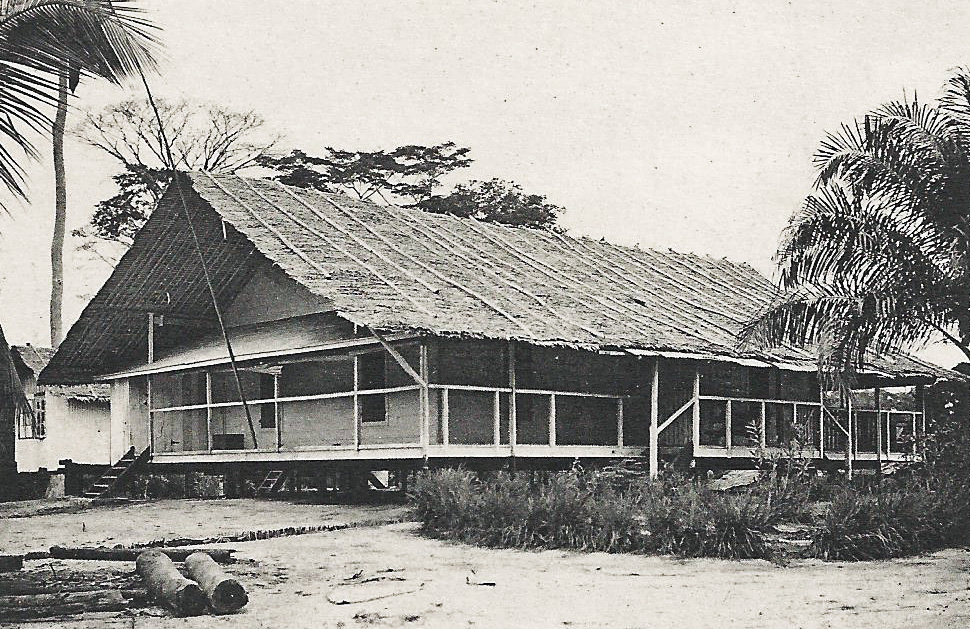 Talagouga. 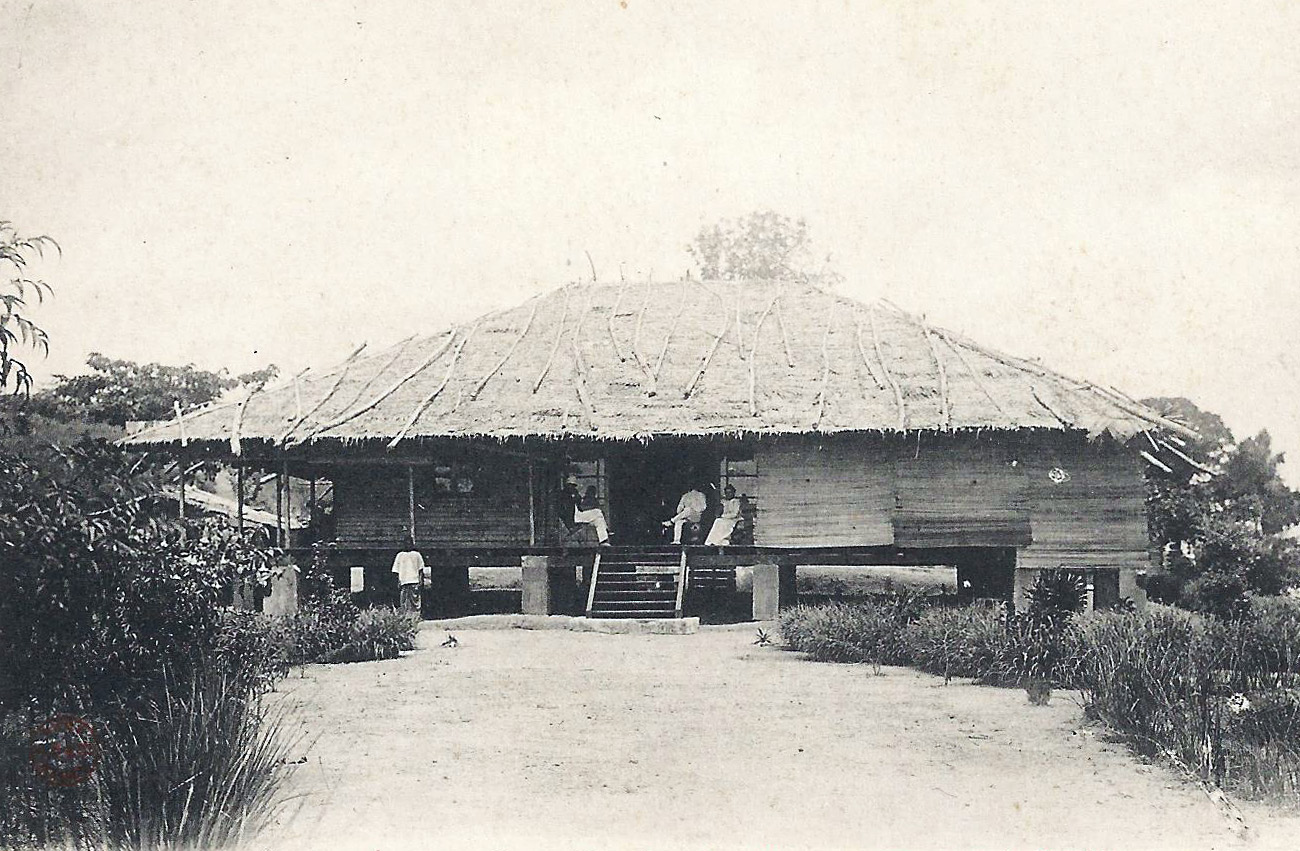 Samkita. 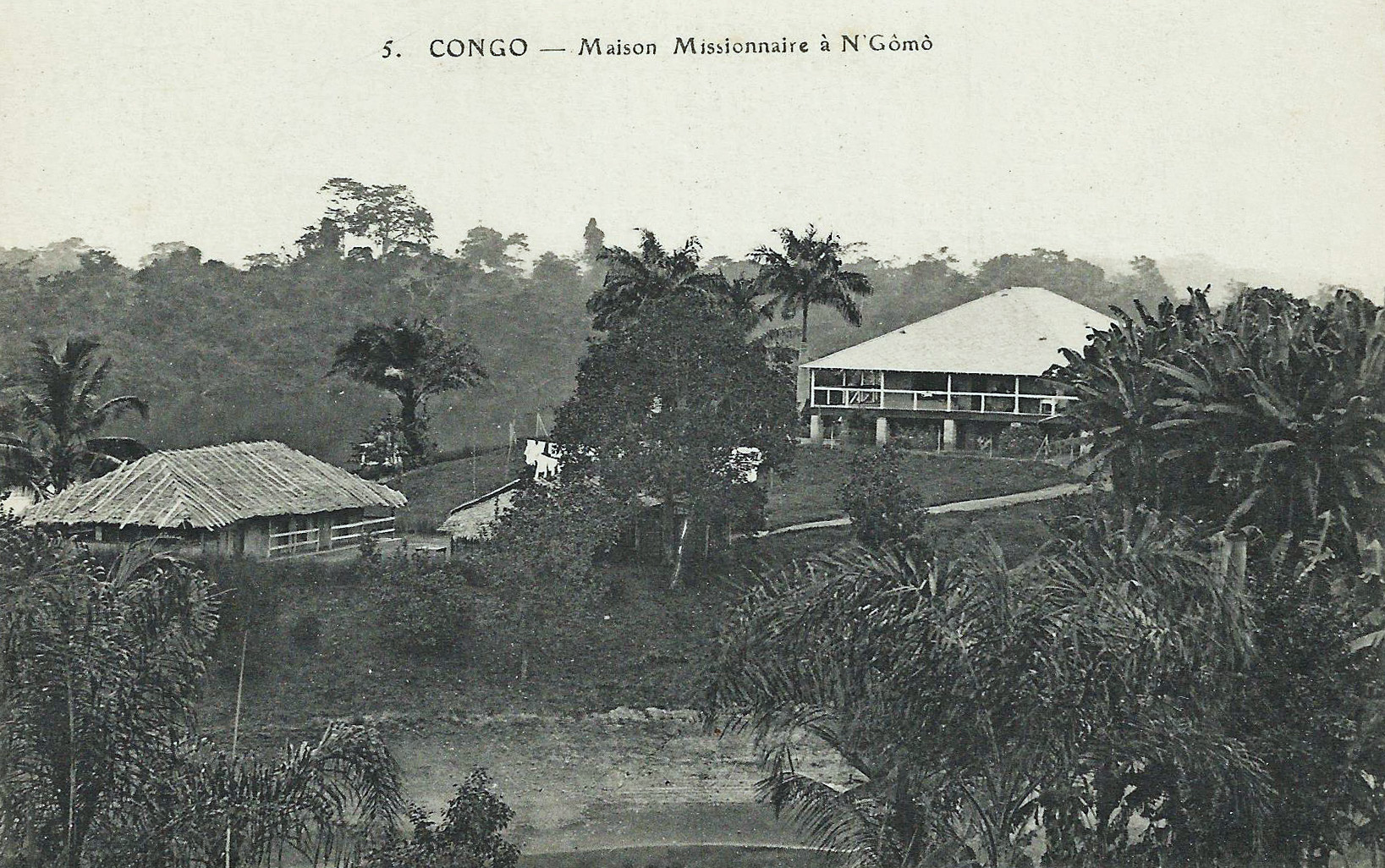 N'Gomo. Cameroun : Douala, Kribi, Bibia, Batanga, Elat (Ebowola), Mozambique : Lourenço Marquez, Lesotho ou Lessouto : Morija, Thaba Bossiou (Basutoland, François Colliard), (puis Buluwagu), Madagascar : Tamatave, Tananarive, Ambatolampy, Antsirabé, Mangarano, Ambositra, Fwianarantsoa, Manankavaly, Miarinnarivo, Zambèze : Lealni (1892), Lweneka, Secheké, Séfula (1891), Livingstone (1893)… Il revient en Nouvelle-Calédonie, en 1925-1926, pour vingt-trois mois, sans être lié à Do Neva, repris par le pasteur Paul Pasteur, et se concentre sur l'ethnologie, les relevés généalogiques, la religion traditionnelle, puis rentre en métropole en 1927. Il enseigne à la section de l'École pratique des hautes études (Sciences religieuses), où il succède à Marcel Mauss en 1940, et fonde la Société des océanistes (au Musée de l'Homme) en 1945, et qu'il préside de 1945 à 1952. Il y connaît aussi Claude Lévi-Strauss. Un de ses premiers étudiants est Michel Leiris. Les tensions sont fortes également dans la grande famille du protestantisme français : un certain nombre de choix de Leenhardt sont remis en cause, dont la séparation du travail de pastorat et de missionnariat. Son neveu, Rey-Lescure, nommé pour le remplacer en 1925, encore moins souple, est envoyé ou renvoyé à Tahiti, dès 1932. Leenhardt est amené à se détacher du monde missionnaire protestant, à la suite de sérieux dysfonctionnements dans l'équipe de direction parisienne. Il participe toujours à la formation (Hermann Kruger) des futurs missionnaires, veut croire à une science missionnaire, et lance encore la revue Propos missionnaires. Il participe avec Paul Rivet et Lucien Lévy-Bruhl à l'organisation de l'Exposition coloniale internationale de 1931. Avec d'autres, il proteste contre le zoo humain, principalement composé de kanak, et participe à sa dénonciation à la Ligue française pour la défense des droits de l'homme et du citoyen. De 1926 à 1938, les relations de Leenhardt avec la Nouvelle-Calédonie se font uniquement par lettres et par visiteurs. Il revient en Nouvelle-Calédonie, en 1938-1939, avec son épouse, comme responsable d'un projet de recherche ethnographique et linguistique de l'Institut d'Ethnologie (EPHE), dans le cadre d'une mission du tout nouveau CNRS. Il s'y trouve confronté à Pwagatch, devin traditionnel païen (jau), représentatif d'un ancien clan Diyô Janu (de Waèn), exilé au Vanuatu puis rapatrié à Bondé (côté Ohot), devenu d'une incontestable autorité spirituelle, formulant une réponse de la tradition au nouvel état des choses dans le milieu kanak et la colonie, et donc considéré comme un dangereux agitateur (néopaganisme, messianisme, sédition). Leur rencontre mène à une conversion de Pwagatch au protestantisme, manifestée dans des cérémonies d'une semaine à Coulna (district coutumier de la commune de Hienghène), fin janvier 1939. La conversion n'entraîne pas durablement les conséquences que peut attendre Pwagatch : prestige, protection, sympathie et issue de secours. Pwagatch est rapidement exilé aux Nouvelles-Hébrides (Vanuatu). |
1920-1939 このセクションは再利用が必要である(2024年10月)。 理由:ウィキ化、リンクするソース、2024年の基準に適合しなくなった。改善するか、改善点を議論する。 フランスに戻った彼は、ニューカレドニアでの宣教師としての経験に関する一連の記事と、新約聖書のアジー35訳を出版した。1920年9月、学者である義 父の家で、モーリス・レーナルトはルシアン・レヴィ=ブリュールと出会い、人類学と民族学の世界への扉を開いた。彼はマルセル・モースとポール・リヴェに 出会った36。 1923年から1924年にかけて、彼はサハラ以南のアフリカにあるプロテスタント・キリスト教伝道所への実態調査の旅に17ヵ月を費やし、5つの国と25の伝道所を訪れた: ガボン:リーブルヴィル、バラカ、ランバレネ、タラグーガ、サムキタ、ンゴモ、ポルト・ジェンティル、キャップ・ロペス、 ガボンの宣教師の家  タラグーガ  サムキタ  ンゴモ カメルーン:ドゥアラ、クリビ、ビビア、バタンガ、エラット(エボオラ)、 モザンビーク:Lourenço Marquez、 レソト:モリヤ、タバ・ボシウ(バストランド、フランソワ・コリアード)、(当時はブルワグ)、 マダガスカル タマタベ、タナナリベ、アンバトランピー、アンツィラベ、マンガラノ、アンボシトラ、フウィアナランツォア、マナンカバリ、ミアリンナリボ、 ザンベジ:レアルニ(1892年)、ルウェネカ、セチェケ、セフラ(1891年)、リビングストン(1893年)...。 1925年から1926年にかけて、牧師のポール・パスツールに引き継がれたドゥ・ネヴァとは関係なく、23ヶ月間ニューカレドニアに戻り、民族学、系図 記録、伝統宗教に集中した後、1927年にフランス首都圏に戻った。1940年にマルセル・モースの後任として宗教科学高等研究院で教鞭をとり、1945 年にはオセアニスト協会(人間博物館)を設立、1945年から1952年まで会長を務めた。クロード・レヴィ=ストロースとも知り合った。最初の教え子の ひとりにミシェル・レリスがいた。 レーナルトの選択は、牧会活動と宣教活動の分離など、多くの点で疑問視された。1925年に彼の後任として任命された甥のレイ・レスキュールは、さらに融 通が利かず、1932年にはタヒチに送り返されたり送られたりした。レーナルトは、パリの経営陣が深刻な機能不全に陥ったため、プロテスタント宣教界から 身を引かなければならなかった。それでも彼は、将来の宣教師の養成(ヘルマン・クルーガー)に参加し、宣教学を信じて、雑誌『Propos missionnaires』を創刊した。 ポール・リヴェやルシアン・レヴィ=ブリュールとともに、1931年の国際植民地博覧会の開催に尽力した。他の人々とともに、カナク族を中心とする人間 動物園に抗議し、人民と市民の権利擁護のためのリーグ・フランス(Ligue française pour la défense des droits de l'homme et du citoyen)に糾弾に参加した。 1926年から1938年まで、レーナルトとニューカレドニアとの関係は手紙と訪問者のみであった。 1938年から1939年にかけて、新しく設立されたCNRSの任務の一環として、民族学研究所(EPHE)の民族誌・言語学研究プロジェクトの責任者と して、妻とともにニューカレドニアに戻った。そこでプワガッチと対面した。プワガッチは伝統的な異教の占い師(ジャウ)で、古代のディヨー・ジャヌ氏族 (ウェーン出身)の代表者であったが、バヌアツに追放され、その後ボンデ(オホト側)に送還された。彼は紛れもない精神的権威となり、カナク族と植民地 における新しい状況に対する伝統的な対応策を打ち出し、それゆえ危険な扇動者(新異教主義、救世主主義、扇動)とみなされていた。二人の出会いがプワガッ チのプロテスタントへの改宗につながり、1939年1月末にクールナ(ヒエンヘーヌのコミューンの慣習地区)で1週間にわたる儀式が行われた。この改宗 は、プワガッチが期待していたような、名声、保護、同情、脱出といった永続的な効果をもたらすことはなかった。プワガッチはすぐにニューヘブリディーズ諸 島(バヌアツ)に追放された。 |
| 1939-1954 Cette section a besoin d'être recyclée (octobre 2024). Motif : idem ci-dessus. Améliorez-la ou discutez des points à améliorer. En France, il met en place, à partir de 1944, des enseignements de langues océaniennes à l'École des langues orientales (INALCO), surtout des langues kanak, principalement du houaïlou (ajië). Il publie en 1947, Do Kamo. La personne et le mythe dans le monde mélanésien. Il revient en Nouvelle-Calédonie en 1947-1948 comme premier directeur de l'Institut Français d'Océanie (IFO), à l'époque du gouverneur Georges Parisot. Les membres sont Pierre Routhier, André Arnould, Jacques Avias, Cohic, Legand, Dadant, Jean Guiart… |
1939-1954 このセクションはリサイクルする必要がある(2024年10月)。 理由:上記と同じ。改善するか、改善すべき点を議論すること。 フランスでは、1944年以降、東洋言語学校(INALCO)でオセアニア諸語、特にカナク諸語、主にホウアイ語(アジエ語)の講座を開設した。 1947年には『ド・カモ』を出版した。La personne et le mythe dans le mélanésien "を出版した。 1947年から1948年にかけてニューカレドニアに戻り、ジョルジュ・パリソ知事の下、フランス海洋研究所(IFO)の初代所長となる。メンバーにはピ エール・ルティエ、アンドレ・アルヌール、ジャック・アヴィアス、コヒック、レガン、ダダン、ジャン・ギアールらがいる。 |
| Les apports à l’ethnologie Cette section a besoin d'être recyclée (octobre 2024). Motif : voir ci-dessus, la critique de ses travaux et de son apport à l'entropologie gagnerait en lisibilité si elle était intégrée à cette section. Améliorez-la ou discutez des points à améliorer. Les apports de Maurice Leenhardt à l'ethnologie sont considérables. Avant Bronislaw Malinowski, il pratique l'ethnologie de terrain préconisée par Marcel Mauss du fond de leur bureau parisien. Pendant vingt-cinq ans, il pratique l'observation proche et la recherche active. Maurice Leenhardt n'a pas cherché à faire école. Il est l'un des premiers à envisager le phénomène social dans sa globalité, en étudiant aussi bien la linguistique, l'art, les mythes ou les activités traditionnelles du peuple kanak. Il est le premier auteur français à théoriser l'existence de la pensée mythique. Claude Lévi-Strauss a repris ce terme. La structure de la personne dans le monde mélanésien, chapitre XI de Do Kamo : le personnage se définit par le jeu de ses relations complexes. Le centre de ces relations est vide, « un soi continuellement engagé en autrui » (Clifford). Chacun des nombreux noms de l'individu le représente dans une de ses relations parentale ou mythique, ses virtualités. Aucun de ses noms ne recouvre la personne tout entière : être social, sans être individuel, un vide. Dans cette anticipation du structuralisme, la pensée mythique en Mélanésie est corporelle autant que mentale. La Parole ou le Verbe sont constitutifs de la subjectivité. « (La relation) est un rapport communiel, c'est-à-dire un rapport personnel qui maintient la participation de personne à personne, et qui est proprement la réalité humaine », (Do Kamo, 271). Communion, surabondance, plénitude. « Go do kamo : je suis vraie personne » (Do Kamo, 271). |
民族学への貢献 このセクションは再利用する必要がある(2024年10月)。 理由:上記を参照のこと、彼の仕事に対する批判と昆虫学への貢献は、このセクションに統合した方が読みやすさが増すだろう。改善するか、改善点を議論する。 モーリス・レーナルトの民族学への貢献は相当なものである。 ブロニスワフ・マリノフスキー以前、彼はマルセル・モースが提唱した野外民族学をパリの快適な事務所で実践していた。25年間、彼は綿密な観察と積極的な 調査を実践した。モーリス・レーナルトは模範になろうとしたわけではない。彼は、言語学、芸術、神話、カナク族の伝統的な活動を研究し、社会現象を全体 的に考察した最初の一人である。彼は神話的思考の存在を理論化した最初のフランス人作家である。クロード・レヴィ=ストロースはこの言葉を取り上げた。 メラネシア世界における人物の構造、『ドゥ・カモ』第十一章:人物は複雑な人間関係の相互作用によって定義される。これらの関係の中心は空であり、「他者 と絶えず関わっている自己」(クリフォード)である。個人の多くの名前はそれぞれ、親的あるいは神話的な関係、つまり仮想性のひとつにおいて、その人物を 表している。これらの名前のどれもが、その人全体を覆っているわけではない。つまり、個人の存在を持たない社会的存在であり、空虚なのである。 このように構造主義を先取りしたメラネシアの神話的思考は、身体的であると同時に精神的でもある。言葉は主観性の構成要素である。「その関係は)共同体的な関係、つまり人から人への参加を維持する個人的な関係であり、人間の現実を正しく表している」(加茂堂、271)。 交わり、超越、充足。「私は現実の人間である」(ド・カモ、271)。 |
| Vie personnelle En juillet 1902, il épouse Jeanne Michel (1881-1970), fille de l'historien de l'art André Michel37. Ils ont 5 enfants37. Son fils aîné Raymond Leenhardt (1903-1982) devient à son tour pasteur et essayiste38,39,40. Maurice Leenhardt est un cousin par alliance des administrateurs coloniaux Paul Feillet (en poste à Nouméa de 1894 à 1903) et Charles Amédée Rognon41. |
私生活 1902年7月、美術史家アンドレ・ミシェルの娘ジャンヌ・ミシェル(1881-1970)と結婚した37。ふたりには5人の子供がいた37。長男のレイ モン・リーンハルト(1903-1982)も牧師、エッセイストとなった38,39,40。モーリス・レーナルトは、植民地行政官ポール・フェイエ (1894年から1903年までヌメアに赴任)やシャルル・アメデ・ロニオン41とは婚姻関係でいとこにあたる。 |
| Publications Ouvrages 1902 : Le Mouvement éthiopien au sud de l'Afrique. (rééd. 1976, Académie des sciences d'outre-mer). 1909 : La Grande Terre. (Brochure, Société des missions évangéliques, Éd. augmentée en 1922). 1922 : Traduction du Nouveau Testament en langue houaïlou. 1930 : Notes d'ethnologie néo-calédonienne. (Institut d'ethnologie). 1932 : Documents néo-calédoniens. (Institut d'ethnologie). 1935 : Vocabulaire et grammaire de la langue houaïlou. (Institut d'ethnologie). 1937 : Gens de la Grande Terre. (Gallimard), 2nde éd. 1952. 1938 : Alfred Boegner. (Société des missions évangéliques). 1946 : Langues et dialectes de l'Austro-Mélanésie. (Institut d'ethnologie). 1947 : L'art océanien. (Éd. du Chêne). 1947 : Do Kamo. La personne et le mythe dans le monde mélanésien. (Gallimard, 1947, 1971 et 1985). 1949 : Les Carnets de Lucien Lévy-Bruhl, préface de M. Leenhardt; Bibliothèque de Philosophie contemporaine (Paris, P.U.F., 1949). Articles [1958] : Notes de sociologie religieuse sur la région de Canala (Nouvelle-Calédonie), Cahiers Internationaux de Sociologie (FRA), 1958, Vol. 24. (préfacé et annoté par Jean Guiart). [PDF] [lire en ligne [archive]] sur l'Institut de recherche pour le développement (IRD, ex. ORSTOM). [1967] : Guiart, Du sorcier imaginé au voyant professionnel, RHR, 1967, no 172 [lire en ligne [archive]]. [1978] : Leenhardt, Le Grand Chef Amane des Poyes de 1898 à 1917, journal de la société des océanistes (JSO), 1978, no 34 [lire en ligne [archive]]. |
出版物 出版物 1902: Le Movement éthiopien au sud de l'Afrique (reedited 1976, Académie des sciences d'outre-mer). 1909: La Grande Terre(パンフレット、Société des missions évangéliques、1922年増補版)。 1922年:新約聖書のホウアイ語訳。 1930年:ネオ・カレドニエン民族学ノート。(民族学研究所)。 1932年:ニューカレドニア文書。(民族学研究所)。 1935:Vocabulaire et grammaire de la languue houaïlou(民族学研究所)。 1937: Gens de la Grande Terre (Gallimard), 2nd ed. 1952. 1938年:アルフレッド・ベグナー。(福音宣教協会)。 1946: Langues et dialectes de l'Austro-Mélanésie (Institute of Ethnology). 1947:L'art océanien(Éd. du Chêne)。 1947: 加茂堂。La personne et le mythe dans le mélanésien (Gallimard, 1947, 1971 and 1985). 1949: Les Carnets de Lucien Lévy-Bruhl, preface by M. Leenhardt; Bibliothèque de Philosophie contemporaine (Paris, P.U.F., 1949). 論文 [1958] : Notes de sociologie religie sur la région de Canala (Nouvelle-Calédonie), Cahiers Internationaux de Sociologie (FRA), 1958, Vol.24 (Jean Guiartによる序文と注釈). [PDF] [read online [archive]] on the Institut de recherche pour le développement (IRD, formerly ORSTOM). [1967] : Guiart, Du sorcier imaginé au voyant professionnel, RHR, 1967, no 172 [オンラインで読む [アーカイブ]]. [1978]: Leenhardt, Le Grand Chef Amane des Poyes de 1898 à 1917, Journal de la société des océanistes (JSO), 1978, No.34 [read online [archive]]. |
| Critiques Cette section a besoin d'être recyclée (octobre 2024). Motif : voir ci-dessus : cette section devrait être intégrées aux sections ci-dessus. Améliorez-la ou discutez des points à améliorer. Critiques anciennes Le pasteur a été très bien accueilli à son arrivée. La société coloniale locale l'a de moins en moins apprécié, jusqu'à ce qu'on cherche et parvienne (provisoirement) à s'en débarrasser. Il a enseigné et fait enseigner à lire, écrire et compter, à de jeunes Mélanésiens confiés par leurs parents. Les enfants ont été ensuite capables de les remplacer pour une relative émancipation économique : vendre et acheter à meilleur prix, se passer d'intermédiaires coloniaux (avec commissions et culbutes), contrôler poids, mesures, décomptes… Briser l'échange inégal a également consisté à vendre des marchandises à prix coûtant aux indigènes, et à exiger que les fournisseurs, employeurs et autres colons, paient régulièrement leur dû, ne serait-ce que pour assurer la nourriture quotidienne des 200 personnes de la communauté, chaque année. Sa propre église lui a également reproché d'avoir rééquilibré la station ou mission de Do Néva, en mettant en place dans chaque village une école de proximité, avec un moniteur, en plus d'un pasteur. Critiques récentes La distinction (1937, pp. 171-185) entre rhe(e) (totem) et bao-bâö (dieux) est discutée : les bao sont autant les génies de la nature que les ancêtres décédés déifiés. Alban Bensa considère la notion de conscience mythique comme partie d'une sorte de théologie ethnologique missionnaire dépassée : « Les sociétés mélanésiennes sont des sociétés éminemment politiques, où la discussion et l'art de faire valoir son point de vue sont très développés », (Chroniques kanak, 1995:152). Éric Wittersheim, Des sociétés dans l'état (2006:42) : « Cantonnés autour de la mission, déresponsabilisés et infantilisés par la vision paternaliste des religieux occidentaux, les Kanak que décrit Leenhardt ne semblent pas le moins du monde affectés par ces bouleversements. Comment Leenhardt a-t-il pu à ce point ignorer l'aliénation profonde dont était victime la société kanak du fait de la situation coloniale, alors qu'il s'employa souvent à les défendre face à l'administration coloniale ? ». Michel Naepels, (Histoires de terres kanakes. Conflits fonciers et rapports sociaux dans la région de Houaïlou (1998:73-86), et Conjurer la guerre. Pouvoir et violence à Houaïlou (2013), écorne Leenhardt dans le premier ouvrage, ce qui lui vaut une forte réaction de Jean Guiart dans Maurice Leenhardt, le lien d'un homme avec un peuple qui ne voulait pas mourir (2003). |
レビュー このセクションは再利用する必要がある(2024年10月)。 理由:上記参照:このセクションは上記のセクションと統合すべきである。改善するか、改善点を議論する。 古いレビュー 牧師は到着当初は非常に好意的に迎えられた。地元の植民地社会は次第に彼を好まなくなり、ついには彼を追い出そうとして(一時的に)成功した。 彼は親から託された若いメラネシア人に読み書きを教え、数えさせた。より良い価格で売り買いすること、植民地時代の仲介者(手数料や賄賂)を使わないこと、度量衡を管理すること、数を数えること......。 不平等な交換の連鎖を断ち切ることは、原住民に原価で商品を販売することでもあり、サプライヤー、雇用主、その他の入植者たちに、毎年200人のコミュニティーの人々の毎日の食料供給を確保するためだけでも、定期的に会費を支払うよう要求することでもあった。 また、ドネバ教会では、各村に地元の学校を設立し、牧師だけでなく教官も配置することで、ドネバ・ステーション(伝道所)のバランスを調整することを批判した。 最近の批判 1937年、171-185ページ)、レ(トーテム)とバオ・バオ(神々)の区別が議論されている:バオは自然の精霊であり、亡くなった祖先を神格化したものでもある。 アルバン・ベンサは神話的意識という概念を、時代遅れの一種の民族学的宣教神学の一部とみなしている。「メラネシアの社会はきわめて政治的な社会であり、 そこでは議論や自分の主張を主張する技術が高度に発達している」(Chroniques kanak, 1995:152)。 レーナルトの言うカナクは、こうした激変の影響を少しも受けていないように見える。レーナルトは、植民地行政に対してしばしばカナク人を擁護していたにもかかわらず、植民地状況の結果としてカナク社会が被った深刻な疎外感にどうして気づかなかったのだろうか。 Michel Naepels, (Histoires de terres kanakes. Histoires de terres kanakes. Conflits fonciers et rapports sociiaux dans la région de Houaïlou (1998:73-86), and Conjurer la guerre. Pouvoir et violence à Houaïlou (2013))でレーナルトを批判し、Jean GuiartからMaurice Leenhardt, le lien d'un hommevec un peuple qui ne voulait pas mourir (2003)で強い反発を受けた。 |
| Publications La mise en forme de cette section ne suit pas les recommandations de Wikipédia (octobre 2024) : découvrez comment la « wikifier ». Ouvrages 1902 : Le Mouvement éthiopien au sud de l'Afrique. (rééd. 1976, Académie des sciences d'outre-mer). 1909 : La Grande Terre. (Brochure, Société des missions évangéliques, Éd. augmentée en 1922). 1922 : Traduction du Nouveau Testament en langue Ajie. 1930 : Notes d'ethnologie néo-calédonienne. (Institut d'ethnologie). 1932 : Documents néo-calédoniens. (Institut d'ethnologie). 1935 : Vocabulaire et grammaire de la langue houaïlou. (Institut d'ethnologie). 1937 : Gens de la Grande Terre. (Gallimard), 2nde éd. 1952. 1938 : Alfred Boegner. (Société des missions évangéliques). 1946 : Langues et dialectes de l'Austro-Mélanésie. (Institut d'ethnologie). 1947 : L'art océanien. (Éd. du Chêne). 1947 : Do Kamo. La personne et le mythe dans le monde mélanésien. (Gallimard, 1947, 1971 et 1985). 1949 : Les Carnets de Lucien Lévy-Bruhl, préface de M. Leenhardt; Bibliothèque de Philosophie contemporaine (Paris, P.U.F., 1949). Articles « Notes de sociologie religieuse sur la région de Canala (Nouvelle-Calédonie) » (préfacé et annoté par Jean Guiart), Cahiers internationaux de sociologie, vol. 24, 1958 (lire en ligne [archive] [PDF]) Jean Guiart, « Du sorcier imaginé au voyant professionnel », Revue de l'histoire des religions, no 172, 1967 (lire en ligne [archive]) Maurice Leenhardt, « Le Grand Chef Amane des Poyes de 1898 à 1917 », Journal de la Société des océanistes, no 34, 1978 (lire en ligne [archive]) |
出版物 このセクションのフォーマットはウィキペディアの推奨(2024年10月)に従っていない。 書籍 1902: Le Movement éthiopien au sud de l'Afrique (reedited 1976, Académie des sciences d'outre-mer). 1909: La Grande Terre(パンフレット、Société des missions évangéliques、1922年増補版)。 1922年:新約聖書をアジェ語に翻訳する。 1930年:ネオ・カレドニエン民族学ノート。(民族学研究所)。 1932年:ニューカレドニア文書。(民族学研究所)。 1935:Vocabulaire et grammaire de la languue houaïlou(民族学研究所)。 1937: Gens de la Grande Terre (Gallimard), 2nd ed. 1952. 1938年:アルフレッド・ベグナー。(福音宣教協会)。 1946: Langues et dialectes de l'Austro-Mélanésie (Institute of Ethnology). 1947:L'art océanien(Éd. du Chêne)。 1947: 加茂堂。La personne et le mythe dans le mélanésien (Gallimard, 1947, 1971 and 1985). 1949: Les Carnets de Lucien Lévy-Bruhl, preface by M. Leenhardt; Bibliothèque de Philosophie contemporaine (Paris, P.U.F., 1949). 論文 カナラ(ヌーヴェル・カレドニ)地方の宗教社会学ノート」(ジャン・ギアールによる序文および注釈)、『国際社会学雑誌』第24巻、1958年(オンライン閲覧可)。24, 1958 (オンラインで読む [アーカイブ] [PDF]) Jean Guiart, 「Du sorcier imaginé au voyant professionnel」, Revue de l'histoire des religions, no. 172, 1967 (read online [archive]) モーリス・レーナルト、「1898年から1917年のポワのアマネ大料理長」、Journal de la Société des océanistes, no. 34, 1978 (read online [archive]) |
| Bibliographie (Classement effectué en ordre croissant d'années d'éditions). [1955] Jean Guiart, « Maurice Leenhardt, missionnaire et sociologue », in Le Monde non chrétien, 1955, 13 p., [PDF] [lire en ligne]. [1964] Jacqueline Roumeguère-Eberhardt, « Actualité de l'œuvre de Maurice Leenhardt pour les études africanistes », in Le Monde non chrétien, no 71-72, juillet-décembre 1964. [1985] Jean Guiart, « Do Kamo, de Maurice Leenhardt, relu en 1986 », dans Journal de la Société des océanistes, no 80, tome 41, 1985, p. 57-85 [lire en ligne [archive]]. [1987] James Clifford (1945-), Maurice Leenhardt, personne et mythe en Nouvelle-Calédonie, Éditions Jean-Michel Place, coll. « Les cahiers de Gradhiva », 1987, 269 p. (ISBN 978-2858930807). [1991] Pierre Bonte et Michel Izard (dir.), « Maurice Leenhardt », in Dictionnaire de l'ethnologie et de l'anthropologie, PUF, Paris, 2008 (1re éd. 1991), p. 412-413 (ISBN 978-2-13-055999-3). [1993] Jean-François Zorn, « Maurice Leenhardt », dans André Encrevé (dir.), Dictionnaire du monde religieux dans la France contemporaine. 5 Les Protestants, Paris, Beauchesne, 1993 (ISBN 2-7010-1261-9), p. 290-291. [1997] Jean Guiart, Maurice Leenhardt, Le lien d'un homme avec un peuple qui ne voulait pas mourir, Le Rocher-à-la-Voile, Nouméa, 1997, 155 p. [2002] Jean-François Zorn, « Évangéliser et servir : Mission et diaconie réconciliées dans la pensée du missionnaire protestant français Maurice Leenhardt », in Martin Rose, Histoire et herméneutique : mélanges pour Gottfried Hammann, Labor et Fides, Genève, 2002, p. 419-430 (ISBN 2-8309-1068-0). [2007] Michel Naepels et Christine Salomon (dir.), Terrains et destins de Maurice Leenhardt, Paris, EHESS, coll. « Cahiers de l’homme », 2007, 165 p., [compte rendu [archive]]. [2010] Jean-François Zorn, « Participation et individuation : Maurice Leenhardt (1878-1954) à la croisée des chemins de l'ethnologie et de la missiologie », in Études théologiques et religieuses, 85e année, 2010/3, p. 347-358. [2022] Jean-François Zorn, « Maurice Leenhardt », dans Patrick Cabanel et André Encrevé, Dictionnaire biographique des protestants français de 1787 à nos jours, t. 3 H-L, Paris, Les Éditions de Paris / Max Chaleil, 2022 (ISBN 978-2-8462-1333-2), p. 719-720. Frédéric Rognon, Maurice Leenhardt: pour un destin commun en Nouvelle Calédonie, Éditions Olivétan "Paroles protestantes", coll. « Collection Figures protestantes », 2018 (ISBN 978-2-35479-437-8). Ouvrage utilisé pour la rédaction de l'article |
書誌 (出版年の昇順に記載)。 [1955] Jean Guiart, 「Maurice Leenhardt, missionnaire et sociologue」, in Le Monde non chrétien, 1955, 13 p., [PDF] [read online]. [1964] Jacqueline Roumeguère-Eberhardt, 「Actualité de l'œuvre de Maurice Leenhardt pour les études africanistes」, in Le Monde non chrétien, no. 71-72, July-December 1964. [1985] Jean Guiart, 「Do Kamo, de Maurice Leenhardt, relu en 1986」, in Journal de la Société des océanistes, no 80, tome 41, 1985, p. 57-85 [オンラインで読む[アーカイブ]]. [1987] James Clifford (1945-), Maurice Leenhardt, personne et mythe en Nouvelle-Calédonie, Éditions Jean-Michel Place, 「Les cahiers de Gradhiva」 series, 1987, 269 pp. (ISBN 978-2858930807)。 [1991] Pierre Bonte and Michel Izard (eds.), 「Maurice Leenhardt」, in Dictionnaire de l'ethnologie et de l'anthropologie, PUF, Paris, 2008 (1st ed. 1991), pp.412-413 (ISBN 978-2-13-055999-3). [1993] Jean-François Zorn, 「Maurice Leenhardt」, André Encrevé (ed.), Dictionnaire du monde religieux dans la France contemporaine. 5 Les Protestants, Paris, Beauchesne, 1993 (ISBN 2-7010-1261-9), pp.290-291. [1997] Jean Guiart, Maurice Leenhardt, Le lien d'un homme avec un peuple qui ne voulait pas mourir, Le Rocher-à-la-Voile, Nouméa, 1997, 155 p.... [2002] Jean-François Zorn, 「Évangéliser et servir : Mission et diaconie réconciliées in la pensée du missionnaire protestant français Maurice Leenhardt」, in Martin Rose, Histoire et herméneutique : mélanges pour Gottfried Hammann, Labor et Fides, Geneva, 2002, pp. [2007] Michel Naepels and Christine Salomon (eds.), Terrains et destins de Maurice Leenhardt, Paris, EHESS, coll. 「Cahiers de l'homme」, 2007, 165 p., [review [archive]]. [2010] Jean-François Zorn, 「Participation et individuation : Maurice Leenhardt (1878-1954) à la croisée des chemins de l'ethnologie et de la missiologie」, in Études théologiques et religieuses, 85e année, 2010/3, p. 347-358. [2022] Jean-François Zorn, 「Maurice Leenhardt」, in Patrick Cabanel and André Encrevé, Dictionnaire biographique des protestants français de 1787 à nos jours, t. 3 H-L, Paris, Les Éditions de Paris / Max Chaleil, 2022 (ISBN 978-2-8462-1333-2), pp.719-720. Frédéric Rognon, Maurice Leenhardt: pour un destin commun en Nouvelle Calédonie, Éditions Olivétan 「Paroles protestantes」, coll. 「Collection Figures protestantes」, 2018 (ISBN 978-2-35479-437-8). 記事に使用した書籍 |
| Nouvelle-Calédonie Société des océanistes (Musée de l'Homme) Science et recherche en Nouvelle-Calédonie Races et racisme (revue) |
ニューカレドニア 海洋学者協会(人間博物館) ニューカレドニアの科学と研究 人種と人種差別(雑誌) |
| https://fr.wikipedia.org/wiki/Maurice_Leenhardt |
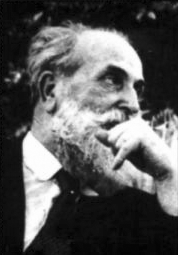
***
| "Leenhardt was born in Montauban. At the beginning of the twentieth century, Protestant authorities concerned themselves with the evangelisation of the Kanaks, in competition with the Marist Brothers. Maurice Leenhardt was named pastor in 1902 in New Caledonia where he founded the "Dö nèvâ" mission in the valley of Houailou. Going beyond his role of pastor, he applied himself to understanding the mentality of these people. When he arrived in New Caledonia, Maurice Leenhardt was welcomed by these words from the mayor of Nouméa: What have you come to do here? In ten years there will be no more Kanaks. He applied himself to the fight against this slow genocide; he combatted the alcoholism that slowly ravaged the Kanak people. He translated the New Testament into the Houaïlou language with the help of his first students. He returned to France in 1927 where he founded the Société des Océanistes and the Musée de l'Homme, and took the chair of Lucien Lévy-Bruhl at the École des Hautes Études en Sciences Sociales. Following a second stay of nearly ten years in New Caledonia, he began teaching Oceanic languages at the Institut National des Langues et Civilisations Orientales in 1944. He died in Paris. Leenhardt's daughter Stella married the historian of religions and theologian Henry Corbin (1933).Maurice Leenhardt's contributions to ethnology are considerable, though he did not frame them theoretically. Before Bronislaw Malinowski, he practiced the ethnology advocated by Marcel Mauss from his office in Paris. For twenty-five years he practiced participant observation and active research, the virtues of which were not rediscovered until the 1960s. Maurice Leenhardt was not a dogmatist and through all these contributions, he never sought followers. He was nevertheless one of the first to consider social phenomena in their totality and to study the art, myths, and customs of the Kanak people as well as their language." | 「レーナルトはモントーバンで生まれた。20世紀初頭、プロテスタント
の当局はマリスト兄弟と競い合いながらカナク族の改宗に尽力した。モーリス・レーナルトは1902年にニューカレドニアの牧師に任命され、ホワイロウの
谷に「ドネヴァ」宣教所を設立した。牧師としての役割を超えて、彼はこれらの人々の心理を理解することに専念した。モーリス・レーナルトがニューカレドニ
アに到着した際、ヌメア市長から「ここで何をしようというのだ?10年もすればカナク族は絶滅するだろう」という言葉を浴びせられた。彼はこの緩慢な大
量虐殺と戦うことに尽力し、カナク族を徐々に蝕んでいたアルコール依存症と闘った。彼は最初の教え子たちの助けを借りて、新約聖書をホアイロ語に翻訳し
た。1927年にフランスに戻り、ソシエテ・デ・オセアニストと人類博物館を創設し、高等社会科学研究学院ではルシアン・ルイ・ブルの跡を継いで教壇に
立った。 その後、ニューカレドニアに10年近く滞在した後、1944年にはパリ国立東洋言語文化学院でオセアニア諸語の教鞭をとった。
彼はパリで死去した。レーナルトの娘ステラは、宗教学者であり神学者でもあるアンリ・コルバン(1933年)と結婚した。モーリス・レーナルトの民族学へ
の貢献は多大であるが、彼はそれを理論的に体系化することはしなかった。ブロニスワフ・マリノフスキ以前に、彼はマルセル・モースが提唱した民族学をパリ
のオフィスから実践していた。25年間にわたって参与観察と積極的な研究を実践し、その功績は1960年代まで再発見されることはなかった。モーリス・
レーナルトは教条主義者ではなく、これらの貢献を通じて、彼は決して信奉者を求めなかった。しかし、彼は社会現象を全体として捉え、カナク族の言語だけ
でなく、その芸術、神話、風習を研究した最初の人物の一人であった。 |
| Leenhardt | |
| LEENHARDT, MAURICE
(1878–1954), was a French Protestant missionary and ethnographer. In
the French ethnographic tradition of the era before World War II,
Leenhardt stands out as a fieldworker of uncommon depth. From 1902
until 1926 he was a liberal evangelist in New Caledonia. His active
defense of the Melanesians against colonial abuses and his stress on
vernacular education and on the growth of autonomous local churches
anticipated what would later be called liberation theology. His
extremely subtle work in linguistics and Bible translation led him to
ethnography. He had a relativist's understanding of cultural process
and invention that brought him to challenge the notion of religious
conversion as a discrete event. Leenhardt envisaged a longer, locally
rooted historical development leading to a fresh articulation of
Christianity, an experience of personal authenticity that would
transcend, not abolish, Melanesian totemism and myth. Upon leaving his mission field in 1926, after a successful, albeit embattled and unorthodox, career, Leenhardt turned his attention more directly to ethnographic description and ethnological theory. With the help of Lucien Lévy-Bruhl and Marcel Mauss he obtained a professorship at the École Pratique des Hautes Études and a post at the Musée de l'Homme. He published four works of detailed New Caledonian cultural description: Notes d'ethnologie néo-calédonienne (1930), Documents néo-calédoniens (1932), Vocabulaire et grammaire de la langue houailou (1935), and Langues et dialectes de l'Austro-Mélanésie (1946). He also wrote a synthetic ethnography, Gens de la grande terre (1937; rev. ed., 1952), and what is perhaps his best-known work, Do Kamo: La personne et le mythe dans le monde mélanésien (1947; translated into English as Do Kamo: Person and Myth in the Melanesian World, 1979). These works are characterized by rigorous attention to issues of linguistic and conceptual translation, by an emphasis on cultural expressivity and change over structure and system, and by an analytic focus on the person. Leenhardt's chief ethnological contribution is his experiential concept of myth. In this view, myth should be freed from the status of a story or even of a legitimating social charter. Myth is not expressive of a "past." Rather, myth is a particular kind of engagement with a world of concrete presences, relations, and emotional participations. It is a "mode of knowledge" accessible to all human experience. There is nothing mystical, vague, or fluid about this way of knowing; it does not preclude logical, empirical activities, as Lévy-Bruhl tended to assume. Myth is fixed and articulated by a "socio-mythic landscape." For Leenhardt, place has a density inaccessible to any map; it is a superimposition of cultural, social, ecological, and cosmological realities. (The valleys of New Caledonia provided his most potent examples.) Orienting, indeed constituting, the person, this complex spatial locus is not grasped in the mode of narrative closure by a centered, perceiving subject. Rather, the person "lives" a discontinuous series of socio-mythic "times"—less as a distinct character than as a loose bundle of relationships. This mythe vécu ("lived myth") calls into question a Western view of the self as coterminous with a discrete body, a view that values identity at the expense of plenitude. Bibliography For a full account of Leenhardt's life and writings, see my work Person and Myth: Maurice Leenhardt in the Melanesian World (Berkeley, 1982). Useful collections assessing his career appear in the Journal de la société des océanistes 10 (December 1954) and 34 (March–June 1978) and in Le monde non chrétien 33 (January–March 1955). On his work in the light of liberation theology, see Jean Massé's "Maurice Leenhardt: Une pédagogie libératrice," Revue d'histoire et de philosophie religieuse 1 (1980): 67–80, and Pierre Teisserenc's "Maurice Leenhardt en Nouvelle Calédonie: Sciences sociales, politique coloniale, stratégies missionnaires," Recherches de science religieuse 65 (July–December 1977): 389–442. New Sources Centenaire, Maurice Leenhardt, 1878–1954: Pasteur et Ethnologue. Nouméa, 1994. |
モーリス・レーナルト(1878年~1954年)は、フランスのプロテ
スタント宣教師であり、エスノグラファーであった。第二次世界大戦前のフランスの民族誌学の伝統において、レーナルトは類まれな深みを持つフィールドワー
カーとして際立っている。1902年から1926年まで、彼はニューカレドニアでリベラル派の伝道師として活動した。植民地による虐待からメラネシア人を
積極的に擁護し、現地語教育と自立した地域教会の成長を強調した彼の活動は、後に解放の神学と呼ばれるようになるものを先取りしていた。言語学と聖書翻訳
における彼の極めて繊細な仕事は、彼を民族誌学へと導いた。彼は文化のプロセスと創造について相対主義的な理解を持っており、それは宗教的改宗を離散的な
出来事として捉える考え方に異議を唱えることにつながった。レーナルトは、キリスト教の新たな解釈につながる、より長く、地域に根ざした歴史的発展を構想
し、メラネシアのトーテミズムと神話を廃絶するのではなく超越する、人格的な真実の経験を思い描いていた。 1926年に宣教地を去った後、レーナルトは、正統派とは異なり、苦難に満ちたキャリアではあったが成功を収めた後、より直接的に民族誌の記述と民族学の 理論に目を向けるようになった。ルシアン・ルイ・ブルールとマルセル・モースの助力により、高等実践学院の教授職と人類学博物館の職を得た。彼は、ニュー カレドニアの文化に関する詳細な記述を4つの著作で発表した。『ニューカレドニア民族誌覚書』(1930年)、『ニューカレドニア文書』(1932年)、 『ハウレウ語の語彙と文法』(1935年)、『オーストロメラネシア諸語と方言』(1946年)である。また、総合民族誌『大地の人々』(1937年、改 訂版1952年)や、おそらく彼の最も有名な著作である『ド・カモ: La personne et le mythe dans le monde mélanésien (1947; translated into English as Do Kamo: Person and Myth in the Melanesian World, 1979). これらの著作は、言語的および概念的な翻訳の問題に対する厳密な注意、構造やシステムよりも文化的な表現力や変化を重視する姿勢、人格に対する分析的な視 点によって特徴づけられる。 レーナルトの民族学上の最大の功績は、彼が提唱した「神話」の概念である。この考え方では、神話は物語や、あるいは社会憲章の正当性を示すものとしての地位から解放されるべきである。神話は「過去」を表現するものではない。むしろ、神話とは、具体的な存在、関係、感情的な参加からなる世界との関わりを表現する特定の種類のものなのである。それは、あらゆる人間の経験にアクセス可能な「知識の様式」である。 この知のあり方には神秘的なものも曖昧なものも流動的なものもない。レヴィ=ブリュールが思いがちであったように、論理的、経験的な活動を排除するもので はない。神話は「社会神話的景観」によって固定され、明確化される。レーナルトにとって、場所とは、いかなる地図にも表現できない密度を持つものであり、 文化、社会、生態系、宇宙論的な現実の重なりである。(ニューカレドニアの渓谷は、彼にとって最も有力な例であった。)この複雑な空間的拠点が、人格を方 向づけ、人格を構成するものであるとしても、中心に位置する知覚主体による物語の完結という様式では把握できない。むしろ、人格は、社会神話的な「時間」 の不連続な連続を「生きる」のである。この「生きられた神話」は、西欧の自己観、すなわち自己を個別の身体と同一視する見方、完全性を犠牲にしてアイデン ティティを重視する見方に疑問を投げかける。 参考文献 レーナルトの生涯と著作に関する詳細な記述については、拙著『Person and Myth: Maurice Leenhardt in the Melanesian World』(バークレー、1982年)を参照のこと。彼の経歴を評価する有益な論文集は、『Journal de la société des océanistes』10号(1954年12月)、34号(1978年3月~6月)、『Le monde non chrétien』33号(1955年1月~3月)に掲載されている。解放の神学の観点から見た彼の業績については、ジャン・マッセ著「モーリス・レーナ ルト: 解放の神学の観点から見た彼の業績については、ジャン・マッセ著「モーリス・レーナルト:解放の教育法」、宗教史・哲学研究誌1(1980年):67- 80、およびピエール・テイエスラン著「モーリス・レーナルトとニューカレドニア:社会諸科学、植民地政策、宣教戦略」、宗教研究誌65(1977年7月 ~12月):389-442を参照のこと。 新資料 モーリス・レーナルト、1878-1954年:パスツールと民族誌学者。ヌメア、1994年。 |
| https://x.gd/py1qg |
★年譜
リンク
文 献
Copyleft, CC, Mitzub'ixi Quq Chi'j, 1996-2099
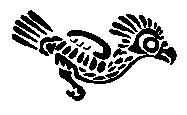
++
Copyleft, CC, Mitzub'ixi Quq Chi'j, 1996-2099
☆
 ☆
☆